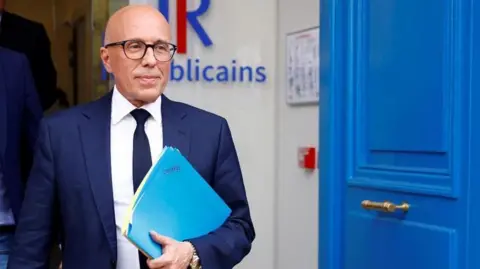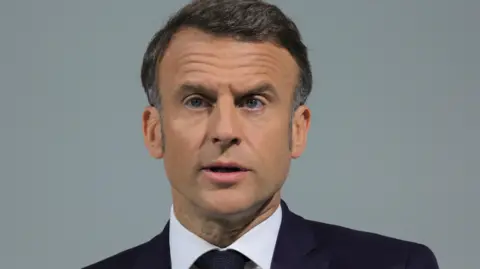French right ditch leader over far-right alliance deal
 REUTERS/Sarah Meyssonnier
REUTERS/Sarah MeyssonnierFrance's Republicans party has dumped its leader, Eric Ciotti, after he called for a political alliance with the far-right National Rally in snap elections at the end of this month.
The right-wing party's political chiefs made the decision little more than 24 hours after Mr Ciotti's plan sparked uproar among Republican politicians.
The apparent implosion at the heart of France's mainstream conservative party comes hot on the heels of National Rally's stinging victory in Sunday's European elections - and President Emmanuel Macron's quick decision to call a national vote.
Mr Ciotti hit back at his colleagues, accusing them of a "flagrant violation" of party rules and insisting he was going nowhere.
Elected party leader in December 2022, Mr Ciotti has always been seen as more hardline than most leading Republicans.
But when he went on TV on Tuesday to announce Republicans "need to have an alliance while remaining ourselves... an alliance with the RN [National Rally] and its candidates", leading party figures said he had only spoken for himself in proposing a pact.
National Rally leader Jordan Bardella then confirmed there was a deal and that his party would be supporting "dozens" of Republican candidates.
Highly respected Senate speaker Gérard Larcher said he would never swallow a pact with the RN, and other colleagues openly called for Mr Ciotti's immediate dismissal ahead of two rounds of parliamentary elections on 30 June and 7 July.
Mr Macron weighed in on Wednesday, accusing Mr Ciotti of turning his back on a party that owed its heritage to former Presidents Charles de Gaulle, Jacques Chirac and Nicolas Sarkozy.
The Republicans have suffered at the polls in recent years, unable to counter the rise of either Mr Macron's centrist party, now called Renaissance, or National Rally. In Sunday's election they could only manage 7.25%.
Although an estimated half of grassroots Republicans back an alliance with National Rally, the vast majority of party leaders have rejected it out of hand.
In an apparent bid to halt his dismissal at an emergency meeting of party leaders on Wednesday, Mr Ciotti ordered the doors of party headquarters in Paris be locked, citing a security risk.
He later asserted that "none of the decisions taken at this meeting carry legal consequences. They may have criminal repercussions". He later told French TV that "about 80" candidates would fight for the Republicans with National Rally backing.
The Republicans have now appointed their lead candidate in Sunday's vote, François-Xavier Bellamy, as interim leader. "Forces of chaos are today threatening our country... We have a line to hold," he told reporters.
Hours earlier, Mr Macron defended his bombshell decision to dissolve parliament and call elections, urging French voters to come together and "say no to the extremes".
 EPA
EPAThe French president denied he wanted to hand the far right the keys to power, arguing that a national vote was the only republican option.
He said that a broad range of political groups who "cannot identify with this extremist fever" should unite against it.
His remarks did not just reflect Mr Ciotti's overtures towards the leaders of National Rally, Marine Le Pen and Jordan Bardella.
He was also reacting to the mainstream centre left's decision to agree a pact with the far left, which he accused of espousing antisemitic and anti-parliamentary attitudes.
On Sunday, Raphaël Glucksmann led the centre left to third place with a campaign that attracted voters alienated by the more extreme France Unbowed of Jean-Luc Mélenchon.
Mr Macron suggested that the masks of both mainstream forces had slipped and the battle for values had burst into the daylight.
Mr Mélenchon accused the president of diving into a strategy of chaos and of drowning in a flood of insults towards "those who don't share his opinion".
Mr Macron has been widely criticised for an apparently spontaneous decision to call elections, an hour after his party polled below 15% while National Rally achieved almost 31.5% in the European vote.
Two years into his second term as president, his party is without a majority in France's National Assembly - so every piece of legislation requires support from political allies.
Mr Macron argued that the system had become jammed, leaving the government unable to act.
He said that, as president, he would not get involved in campaigning and would leave that to Prime Minister Gabriel Attal - though his speech on Wednesday sounded very much like the launch of his party's campaign.
Asked by a reporter whether he had handed the keys of France to the far right, Mr Macron said that doing nothing was not an option and asking the people to decide was a principle of democracy.
Voters who had backed National Rally on Sunday had expressed their anger, he said, adding: "Message received."
